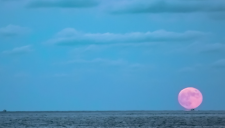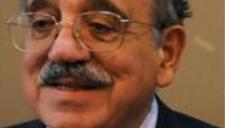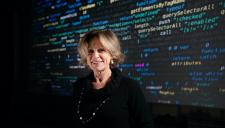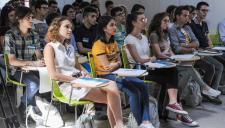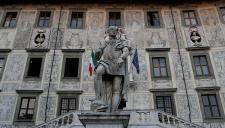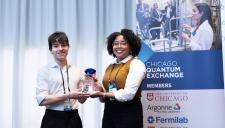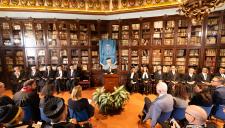Hello and welcome to the inauguration ceremony of the academic year of the Scuola Normale Superiore, on the 212th anniversary of its foundation, on October 18th, 1810.
Today is a special day, as all those days are that start us off on a new path: many challenges await us this year, which I trust that the lecturers – myself among them -, researchers and technical-administrative staff will be able to face with the spirit which essentially characterises our institution, a spirit of service to the values of the Scuola Normale: rigour in study and research, daily commitment, openness to dialogue and to the influence of others, the willingness to overcome personal limits.
Over two centuries of history are behind us, but we are proud to note that this institution and the values we aim to cultivate continue to exert a great fascination for the new generations of Italians. We see this from our admission competition, which a few weeks ago attracted hundreds of students, both male and female, from all regions of Italy to Pisa and Florence, following a pre-selection through the TOLC tests of the CISIA Consortium. I thank the examination boards for the difficult work they have done: the selection of students is perhaps the most important moment - certainly the most demanding, putting upon us a great responsibility - in the life of our Scuola Normale, and I know from experience how much emotional energy it demands of us.
In preparing a conference at the Accademia dei Lincei a few weeks ago, to commemorate Vito Volterra, I came across the acts of the centenary of his birth, which were celebrated on 19.11.1960 at the Lincei and, the following day, here at the Scuola Normale. I was struck by the words of normalista Alessandro Faedo, who was rector of the University of Pisa in those days, later becoming President of the CNR; his words are still valid today, although, of course, a lot has changed:
Young people arrive at the Scuola Normale from all over Italy, attracted by the prestige of its glorious past and often also by the fact that the competition it offers can represent the only means (as in Volterra) to allow young people of high talent and modest economic means to attend University.
Young people who have had a very different preparation are subjected to a thorough examination, not for the examiners to find out how many things they know (because this also depends on the quality of the teachers they have had) but for them to get the measure of their ingenuity and their aptitude for scientific thought.
Sometimes all it takes for these gifts to come to the forefront is the flashing of an intelligent gaze that reacts positively to a question, even if it cannot fully answer it.
I therefore welcome the 70 new students of the Scuola Normale, including 2 of the 25 alfieri del lavoro (standard bearers of work) nominated a few days ago by President Mattarella, sure that they will soon feel an integral part of our small-large community, and I greet all the students of the undergraduate course who are already part of this community.
The city with the highest number of applications we have received is Rome. In more general terms, 83% of our students in the undergraduate degree course, about 300 in number, come from outside Tuscany, with Lombardy the most represented region in the student demography. This significant presence of deserving girls and boys who come from outside the region, even from areas where high-level universities are based, seems to me one of the surest indicators of the Scuola Normale's healthy reputation. A considerable number of our PhD students come from abroad, 20% of the total, including from advanced nations such as Germany, Canada and Japan. My greeting for the start of the academic year also goes out to the students of our Postgraduate Course, about 300 graduates.
Of course, I do not hide from you the fact that there are some critical issues associated with our selection processes, which we have recently had the opportunity to discuss in the faculty councils: we need to improve our performance in some disciplines and, despite some encouraging signs, a severe gender gap persists in other disciplines, in particular mathematics and physics.
It is up to us to put in place the right tools once more this year to help newcomers to undertake a profitable course of study and to equip them to successfully face the continuation of their careers. And I want to emphasise that for us this "success" is measured first of all in terms of increasing self-awareness of one's abilities, but we must not forget that there will also be limits, to methodological rigour, because we continue to be convinced that once this rigour is acquired, all careers will consequently be satisfying, whatever they are.
One of our former students of the Faculty of Humanities, Allegra Iafrate, for some years an official of the Ministry of Foreign Affairs in an Italian Cultural Institute in Brussels, spoke precisely of this during a greeting speech to the new graduates that she gave in my first year as Director. She said: " in absolute contrast to what is often recommended today, always with a view to finding work more easily, no one at the Scuola Normale has ever insisted on structuring a one-way scholarship right away, to create a recognisable disciplinary profile aligned to ministerial formats. There has been no insistence of a specialist nature here. It was the Scuola Normale, through its lecturers and through its organisation, that indirectly encouraged me to be at one and the same time a person of letters, art historian, violinist and would-be Orientalist, but making me realise that with a lot of work it would perhaps be possible to acquire that quality that our beloved medieval monks would have called subtilitas, that is, the refinement of thought and the precision of work and the becoming of professionals, whatever you aspire to or achieve ”.
Iafrate, with her experience, has well described one of the peculiarities of the Scuola Normale within the Italian university system and in particular that of the higher educational institutions with special status. It is up to us to continue to work to make ourselves known for this special quality, as a reality that first of all spurs us to be professionals, in study, research, teaching, and in carrying out any profession, for our entire lifespan. It is the evocative legacy of the philologist, governor of the Bank of Italy and erstwhile President of the Italian Republic, Carlo Azeglio Ciampi.
And it is our duty to bring this message to as many potential future students as possible.
We are already doing this in many ways, for example by encouraging dialogue with school groups. And right now I want to thank all our students for their commitment in this activity, a commitment not taken for granted if we think about how busy their days are between study and exams. For years, the student body of the Scuola Normale has participated in the organisation of events such as the mathematics Olympiad and other international competitions, and this virtuous circle, with our students mentoring potential young recruits, helps us to keep alive the contact with the Italian high schools.
And we intend to focus increasingly on young female students, to encourage an increasing number of girls to try their hand at scientific disciplines, to alleviate one of the critical issues I have already talked about. Although obviously we cannot expect to see immediate results, much has been done this year, such as the internship organised by students and alumni of our Science Faculty that we hosted for the European Girls' Mathematical Olympiad (EGMO), an international maths competition in which only girls compete; we will achieve much with the Ispira project, which so far has involved about forty middle schools in Pisa and its province and which has seen 11 students of our postgraduate course present a current scientific topic to schoolchildren.
Another action taken to get in touch with the new generations is “ la Normale a Scuola ”, which was created in the period of the lock-down. At the third edition, we held 75 different lessons online in the 2021/2022 academic year, many of which were repeated several times, and which were attended by about 7,000 students coming from all areas of Italy. Although this initiative is voluntary, not falling within the teaching obligations, this year alone 41 lecturers, researchers, fellows and, for the first time, students of the last year of the PhD course, have contributed to these lessons, which represent for thousands of schoolchildren the opportunity not only to broaden their knowledge of topics they have already studied, but also to be introduced to topics not present in their school curriculums.
University orientation remains one of our main tools for approaching the new generations. Our orientation courses are not purely aimed at presenting only the syllabus of the Scuola Normale: they promote, not the Scuola Normale, but the Italian university - a true action of public engagement targeting the best talents to ensure that they do not waste their potential with wrong university choices. So much so that more than half of the lecturers who participate in our courses, for example those this year which took place in Pisa, San Miniato, Milan, Rome and Naples, are not part of our teaching staff, but come from other universities. Furthermore, in the last admission round, just 17% of students aspiring to become pupils had participated in our orientation courses; the remaining percentage are aware of us because ... the Normale continues to be perceived in the collective imagination, above all of the teachers of the Italian schools, who are our greatest and best promoters, as being among the most popular destinations for girls and boys with great talent for study and research. It is my responsibility, as well as that of the lecturers and all the staff of the Scuola Normale, to ensure that this continues. In relation to the orientation, I would also like to mention the important government investment made in the field of PNRR (the National Plan for Recovery and Resilience). It is our intention to participate also in this action, bringing to it our experience, but also considering some adjustments to our traditional model.
I would now like to welcome professors who have taken up their posts this year, or who will do so in a few days' time: for full professors, the professor of Classical Archaeology, Barbara Elisabeth Borg. and the professor of Condensed Matter Physics, Vittorio Giovannetti; for the associate professors, Emanuele Berti - Latin Language and Literature; Giuseppe Brancato - Physical Chemistry; Marco Deseriis - Sociology of Cultural and Communicative Processes; Franco Ligabue - Experimental Physics, Stefano Luin - Condensed Matter Physics; Andrea Mennucci - Mathematical Analysis; Francesco Raimondi - Molecular Biology. I trust that you will all to work with passion and dedication for the good of the Scuola Normale. I also welcome the team that makes up the governance of the Scuola Normale and that has shared with me the burdens of the institutional commitment: the Vice-Director, Mario Piazza, the Deans Andrea Ferrara of the Faculty of Sciences, Stefano Carrai of the Faculty of Humanities, and Guglielmo Meardi of the Faculty of Political and Social Sciences. I welcome the Vice Rectors and Delegates of the Scuola Normale, the President of the Carlo Azeglio Ciampi Institute of Advanced Studies, Mario Pianta, the General Secretary Enrico Periti, and our manager Daniele Altamore .
The Scuola Normale Superiore mainly covers disciplinary fields related to fundamental research, which, as you know, is aimed primarily at achieving the advancement of scientific knowledge - both in the so-called hard sciences (physics, mathematics, biology and chemistry), and in the field of the humanities and social sciences (I.e. history, literature, philosophy, political science, philology, history of art…). A great philologist and literary critic and a former student of the Scuola Normale, Pietro Citati , who passed away this year in July, described very well the essence of this type of research, recalling the years of his education at the Normale: " I had the childhood dream of pure science,” writes Citati, “the passionate, sharp, dispassionate search for truth, whatever it is ". I do not think there can be a better definition of what the ultimate goal of the Scuola Normale should be.
I quote the scientist and director general of CERN, Fabiola Gianotti : "Scientific research and technological developments are the lifeblood and soul of progress, and the economic rebirth of our country and of the entire continent takes place through investments in fundamental research ".
The distinction between pure and fundamental research and applied research, and funding strategies, were among the topics addressed by the Technical Committee for an Italian Strategy in the field of fundamental research, an interdisciplinary group of 10 experts set up by the MUR in March, coordinated by me, which also saw the collaboration of the Nobel laureate Giorgio Parisi and which produced a first document in July, a five-year plan that covers the years from 2023 to 2027. Here again I greet Mario Pianta , who was one of the experts on the committee with me and whose support as an economist was crucial. What are the issues we addressed?
Fundamental research versus applied research
The "step" of 2026
Investment in human capital
While recognizing that the distinction between fundamental and applied research is often subjective, transient and highly variable over time – just think, for example, of all the mathematics and physics necessary for technologies and instrumentation in the fields of information technology, telecommunications, transport, the emerging sector of artificial intelligence or quantum computing which a few days ago saw the award of a Nobel Prize – and while admitting that the distinction is blurred, one cannot fail to recognize in the PNRR an imbalance in favour of industrial and applied research. We therefore propose a rebalancing of the document, in particular with actions on the PRIN and FIS calls.
Another issue, again linked to the PNRR, is the step that will be determined in 2026, without corrective actions, at the end of the PNRR. There will in any case be a step, but without corrective actions there would be a risk of bringing down the ratio between public spending on research and development and GDP to the levels of 2009, while it would be necessary to remain at least at the level of 0.7% of GDP in order for us to attain an order of magnitude comparable to that of other more virtuous countries. We have therefore proposed an additional investment in the five-year period, progressive and aimed at compensating for this step, also to stabilise the investment in human capital that will in any case be made in the context of the PNRR, but only on fixed-term positions.
In recent weeks, the Accademia dei Lincei has taken on the task of promoting a proposal, of which I too am a signatory, that in the agendas of all Italian governments, in a bipartisan way and therefore regardless of political affiliation, there may be a multiannual programme that stabilises public spending on research and development, also because the world of research cannot do without a multiannual programming.
I close this chapter to remind you, once again, how fundamental investments of this type would be for the future of the country. We know that poor funding and low salaries mean that many Italian PhDs, whose number has greatly decreased over the years, move abroad, often not for a temporary specialisation, but permanently.
We also see this phenomenon at the Scuola Normale: last July, students who entered in 2016 obtained their SNS degree. Well, it is striking that about a third of the new graduates applied for and obtained a doctoral position at universities and institutions abroad. Of course, to know that the students who are trained here obtain scholarships in centres of great prestige such as the Humboldt University of Berlin, the University of Oxford, the Ludwig-Maximilian-Universität of Munich, EPFL Lausanne, ETH Zurich, Columbia University or EMBL Heidelberg, on the one hand makes us proud, because we consider it another index of the quality of the education we offer, but on the other hand leads us to reflect on a mechanism that risks taking away some of the country's best resources, without mechanisms that facilitate their return. However, it must be said, and here I would like to see the glass as being half full, that the network of our students abroad is in any case a great driving force for development also for the research and collaborations carried out here, in Pisa or in Italy as a whole, and that recently tax incentives and career acceleration mechanisms have begun to produce some positive effects of return or attraction towards Italy.
Of course it gives us great pleasure to see how Normalisti stand out in the world: to cite recent examples just in the field of physics and cosmology, we can mention Marco Velli, full professor at the University of Los Angeles and scientific coordinator of the Parker Solar Probe mission, the NASA probe which was the first ever to enter the solar corona; then there is Massimo Stiavelli, at the helm of the team of 300 scientists who built the James Webb Space Telescope, the largest telescope so far put into orbit and whose surveys on the first galaxies formed in the universe are also being worked on by the Cosmology group of the Scuola Normale; last but not least we have Teresa Fornaro, the astrobiologist among the 13 scholars chosen by NASA to discover the secrets of Mars with the rover Perseverance.
We call to mind the many Humanities scholars with teaching posts in the departments of prestigious international universities: Laura Castelli in the department of classical studies at the University of Cambridge, Stefania Tutino in the department of history at the University of California in Los Angeles, Barbara Carnevali in the department of philosophy at the École des Hautes Études en Sciences Sociales of Paris, or Alessandro Giammei in the department of Italian Studies at Yale.
The Faculty of Political and Social Sciences, although recently established, has not failed to distinguish itself. I am thinking of the consolidated collaboration with the Region, for the 5th report on the infiltration of organised crime in Tuscany, of 3 important funding grants from the European Commission, of the applications to welcome researchers with Marie Sklodowska-Curie grants for studies on the new challenges of democracy in the face of demographic, technological and environmental changes. The faculty's research is thus confirmed as being at the service of understanding how forms of participation and governance can adapt to challenges that require deliberations on a geographical and temporal scale different from those for which our institutions were created.
Returning to the National Recovery and Resilience Plan, our involvement in projects is very extensive, considering the size of the Scuola Normale, and in the coming years this will doubtless be a challenge in terms of both research and governance. We will be able to significantly increase both the number of doctoral positions, the research staff and the infrastructural endowment, thanks to:
• The ecosystem of innovation “THE - Tuscany Health Ecosystem ", in which the Scuola Normale is a leader in the Biotechnologies and imaging in neuroscience sector , coordinated by Antonino Cattaneo, and an affiliate of the Nanotechnologies for diagnosis and therapy sector , with contacts Fabio Beltram and Francesco Cardarelli .
• The National Research Centre in High Performance Computing, Big Data and Quantum Computing, which, proposed by the National Institute of Nuclear Physics, has 51 founding members throughout the country.
• The partnerships extended thanks to projects involving in particular Fabio Beltram with the NQSTI project (National Quantum Science and Technology Institute), Alessandro Schiesaro with the CHANGES project ( Cultural Heritage Active innovation for Next-GEn Sustainable Society ) and Fosca Giannotti with the FAIR project ( Future Artificial Intelligence Research ).
Naturally, the development of this activity, and more generally of all the Scuola Normale's planning, will be possible only with the contribution of the technical-administrative staff. Thanks to a specific mandate given to the General Secretary, Enrico Periti, we have launched a highly ambitious three-year plan for the recruitment of technical-administrative staff, which goes well beyond turnover. For my part, respecting the roles, my commitment is to continue to personally follow all trade union meetings, be they about bargaining or consultation. I think that the various important agreements concluded in these three years are a testament to my commitment on this front too.
Moreover, we will not shirk from the effort to identify other possible growth sectors, in terms of staff but also incentives for technical and administrative staff, such as in the recent past with the MUR funding to our two academic faculties of Humanities and Sciences in the field of the Departments of Excellence, funding that I hope will be replicated in the five-year period 2023-2027 for the Faculty of Humanities with a project on Europe and other civilizations, with particular attention to the cultural relationship between East and West, coordinated by Flavio Fergonzi , and for the Faculty of Sciences with the project The Creation of a Quantum Information Center inclusive of all the scientific areas of the Faculty, coordinated by Franco Flandoli. As it was already five years ago, the genesis of these projects is the stimulus for interdisciplinary collaborations within the faculties that make us understand how functional our internal structure still is, based precisely on the three academic faculties, the two Pisan ones and the Florentine one.
We also recall the many funding grants for high-level scientific projects that the professors and researchers present on our staff are able to win: only in the current year, for example, to mention only the ERCs, the most elite European research funding, 1,200,000 euros to Stefano Carniani for a cosmology project concerning the study of the winds in the first galaxies of the universe, 1,800,000 euros to Franco Flandoli for a fluid dynamics project, 2,500,000 euros to Barbara Borg, the archaeology professor who arrived in July from the University of Exeter in England, for a study on ancient inscriptions, not counting the 12 ERCs previously obtained since 2007, some for projects still in progress.
These awards are testimony to the high quality of the research of the Scuola Normale, as well as the positioning in certain international rankings that use indicators of an intensive rather than extensive type. We must in no way consider these tools, the rankings on the best universities in the world, as real indicators to determine the health or otherwise of our institution: there are many imponderable variables and potential conflicts of interest that give rise to flattering or frustrating trends. For example, this year the Scuola Normale went straight to fifth position worldwide in a special ranking, that of best small universities edited by the Times Higher Education, in which the California Institute of Technology came out on top, with the Normale first in Europe. A gratifying result if it were not for the fact that nothing particularly relevant has happened for which the Scuola Normale, in the year 2022, should be considered among the best 5 small universities in the world, while last year it did not even appear in this ranking: small we were and small, indeed perhaps a little less, we have remained. That said, despite the limitations of some assessment methods and the variability of the results over time, some of the parameters used in the rankings (research output, academic reputation, student/teacher ratio) have a clear correlation with academic excellence and, if interpreted and used correctly, they can act as stimuli for improvement. We will certainly continue to monitor the trend of rankings that are more attentive to the quality of numbers, such as the Shanghai rating, in which in the PCP ranking, per capita performance, the Scuola Normale is 10th in the world and third in Europe (if we continue to include the United Kingdom! ).
Small but significant changes in our internal legislation have occurred in the last year, and others are in the offing. Among the first will be some concerning our Statute, our "constitutional charter". In the new version, developed in the wake of a long and participatory process between the end of 2021 and the beginning of this year, and which saw a substantial increase in representation in the authoritative bodies, in the Italian version the word Direttrice appears for the first time next to that of Direttore, as well as professoressa next to professore, and allieva next to allievo. A sign of a break with the past, a text that provides for the masculine and feminine for the nouns that designate all the various academic components, but not only, and that we are gradually extending to all internal regulations. I also see this as a wish that one day we can elect a lady Director of the Scuola Normale. This change is partly the result of the Gender Equality Plan, the plan drawn up between now and 2024 to achieve a broader gender balance. This document, also the result of a participatory process that involved all the components of the Scuola Normale, will, however, be a dead letter if it is not articulated in the pursuit of clear and measurable objectives that ensure fair and transparent assessments, and on this I invite the governance, but also the entire administration, to assist me in finding the right tools to graft good practices aimed at achieving a greater gender balance at the Scuola Normale.
Other challenges we face, which require the collaboration of all of us, concern energy saving, for which we have prepared a specific action plan and a specific awareness campaign, and IT security. After the recent cyber attacks that to a certain extent also affected the Scuola Normale, we have strengthened the authentication and control mechanisms to protect our networks, and the recent agreement with the Tuscan Postal Police must be understood with a view to further attention to a such a delicate subject, on which one's guard must never be let down. These are all challenges that will certainly have to be faced with the same collaborative spirit that has characterised our community in these years of COVID. Speaking of IT in more positive terms, on this occasion I would like to remind you that if Pisa was a pioneer in electronic computing and then in internet connections, as was also recently mentioned at the Internet Festival, it is also thanks to the insights of Alessandro Faedo and to Gianfranco Capriz' directorship of the Istituti del Calcolo. Gianfranco Capriz passed away on 10 October, just a few days ago, a few days before he turned 97.
Both of the emergencies that I have mentioned are more or less directly linked to the war in Ukraine. As an academic institution we cannot remain indifferent and we have endeavoured to make our small contribution, to the understanding of the phenomena in progress on the one hand (and here I would like to mention the various interventions in the public debate by Silvio Pons, historian, President of the Gramsci Foundation and diligent scholar of the Soviet world) and on the other hand with activities of support for selected Ukrainian and Russian scholars. The invasion on the one hand, and the repression of dissent on the other place people on both sides in situations of great difficulty and suffering.
With regard to the new Statute, the Scuola Superiore Sant'Anna is our "privileged interlocutor for research, training and Third Mission" (bearing in mind the fact that in Florence we are experimenting with the awarding of joint degrees, and the strong collaboration in place in the network European EELISA); I therefore thank the rector, Sabina Nuti, for the continuous exchanges that arise from the similarity and complementarity of our institutions.
Alongside this, we have introduced, in the same article of the Statute where this privileged relationship is spoken of, a specific reference aimed at promoting institutional collaboration with the other special-status institutes of higher education. It is the internal regulatory prerequisite for the creation of a network of institutes of higher education with a special status, which includes the Normale and S.Anna here in Pisa, IMT in Lucca, GSSI in L'Aquila, IUSS in Pavia and SISSA in Trieste, to which could be added the Scuola Superiore Meridionale in Naples, hence creating a network going beyond the experience of the three-way Federation. Precisely to talk about these issues and to build on this process, which has already borne fruit in the last few years, we held a meeting in Lucca a few days ago, on the 14th. There are many ties that bind us, such as the selection of students, research as a pivotal point of the activities, the high productivity rate of the teaching staff and the quota number of students. We are academic entities different from generalist universities, with a complementary role with respect to them, and it is worthwhile for all of us to work as a system, among ourselves and with them.
The new assessment unit of the Scuola Normale will also be called upon to pronounce on these issues. The unit is chaired by a personality with great experience in academe and in the world of institutions: Professor Stefano Fantoni, president of the Fondazione Internazionale Trieste per il Progresso e la Libertà delle Scienze (Trieste International Foundation for the Progress and Freedom of the Sciences), and former President of ANVUR. I also take this opportunity to greet the Associazione Amici della Scuola Normale Superiore (Friends of the Scuola Normale Superiore), which supports us so much in our educational, research and cultural projects, and in particular its President, Salvatore Rossi, elected this year.
We must look to openness and sharing, thinking first of all of the wealth of knowledge developed within our walls to be made available to society. This is why the Scuola Normale has included the development of Open Science in its 2019-2024 development plan. In fact, Open Science means dissemination of publications and sharing of data, also in certain scientific areas of software, to promote transparency in the research process and the full use of results, to prepare future young researchers to be competitive in Europe and in the world. We are moving strongly in this direction; for this reason, we have made sure that the educational curriculum of PhD students is enhanced by a course, in Italian and English, on the topics of Open Science and on the management of research data.
In the context of what I call the Pisan ecosystem of research, I believe that the Scuola Normale, the Scuola Superiore Sant'Anna and the University of Pisa must engage in continuous dialogue with a view to collaboration, in which competition exists but has a marginal role. Much unites us and will continue to unite us also in this academic year, including joint doctorates and degrees, educational and research agreements, and scientific centres in common, not only within the PNRR: recently the three Pisan universities have also inaugurated a joint help desk for the prevention of all forms of violence, mobbing and discrimination. And let us not forget the great synergy we have with the CNR, and with the Scuola IMT of Lucca, just a few kilometres away (whose Rector, Rocco De Nicola, I here welcome), especially on topics such as Big Data and Artificial Intelligence. All this binds us together in a form of cooperation that, in my opinion, is increasingly necessary, and I am convinced that this same spirit will animate our relations also in the near future; I take this opportunity to greet the former rector Paolo Mancarella, with whom there has been full harmony and collaboration in recent years, and to congratulate the new rector of the University of Pisa, Riccardo Zucchi, on his very recent appointment.
Another collaboration between the Scuola Normale and the Fondazione Pisa (the Pisa Foundation), is a proposal for the cultural enhancement of Piazza dei Cavalieri and its historical-artistic heritage combining scientific research and high-level dissemination, with the participation of various institutions such as the Soprintendenza Archeologia Belle Arti e Paesaggio (Authority of Archaeology, Fine Arts and Landscape) for the provinces of Pisa and Livorno and the State Archives of Pisa. We will have the opportunity to speak about this specific project, curated by Professor Lucia Simonato, in a public event on November 5th.
I would also like to mention other significant ongoing collaborations of the Scuola Normale, but limiting myself only to the most recent ones and to the next innovations, since it would be impossible to mention them all: the one with CONSOB for monitoring the orderly execution of market negotiations thanks to specific algorithms developed by our mathematicians and IT specialists; between the Laboratorio di Biologia Bio@SNS and the Istituto di Ricovero e Cura a Carattere Scientifico Fondazione Stella Maris (the Stella Maris Foundation Scientific Institute for Research Hospitalisation and Health Care) for joint biomedical research programmes, a collaboration inaugurated just this year; with the Unione Industriale Pisana (Pisan Industrial Union), recently renewed; the "TOSCANA X.0 - Toscana DHI Digital Innovation Hub" project involving CNR, Scuola Sant'Anna, Scuola IMT and the three Tuscan universities, for the creation of a hub to support the digital transformation of small and medium-sized enterprises and public organisations and in which the Scuola Normale will contribute through its High Performance Computing Centre.
Precisely in this month of October we are finalising the deeds for the concession to the Scuola Normale of an important building owned by the Tuscany Region. The building is located in Via Roma, close to the Solferino Bridge, and dates back to the late nineteenth century, with over a thousand square metres spread over three floors. Thanks to the concession in substantially free use, this building becomes another important acquisition of the Normale in the centre of the city of Pisa; it is already practically ready for use, with new spaces for our PhD students and for our research groups. The operation, initiated by our previous Director Vincenzo Barone and by the President Enrico Rossi, was finally completed thanks to the effective collaboration of the building offices of the two institutions. I would like to thank President Giani for his continued attention to this commitment made with the Scuola Normale, and the President of the Regional Council, Antonio Mazzeo, for his direct intervention in order for the affair to be concluded in the past few weeks. When the time comes for the reopening, in the very first months of next year, I hope that we will be able to organise a public inauguration event with Presidents Giani and Mazzeo and with Councillor Nardini.
And just today - and I am about to conclude - we inaugurate the exhibition Le vite del marmo. Sculture del Museo Archeologico Nazionale di Firenze nella Villa Corsini a Castello (The lives of marble. Sculptures of the National Archaeological Museum of Florence in the Villa Corsini a Castello), curated by Gianfranco Adornato, in the space of the Torre del Conte Ugolino in the Palazzo dell'Orologio. I invite all our guests to visit the exhibition, also made possible by a contribution from the Associazione Amici della Scuola: it intends to relate the lives, or rather the biography, of some works selected by the “Sezione distaccata della Scultura Antica” of the Archaeological Museum of Florence, housed in Villa Corsini a Castello, showing the visitor the study methodologies adopted. The intent is to show how even damaged works of art can tell us stimulating stories, which greatly enrich not only the historical-artistic knowledge but also the technical-scientific knowledge of the sculptures.
This day will then continue at the Teatro Verdi in Pisa, for the first appointment of our 56th series of classical music concerts, which will continue until June at the Verdi and partly in this Hall. The concert is free, thanks to the generous contribution of the Fondazione Pisa (the Pisa Foundation), an institutional partner of the Concerti della Normale. Music by Vivaldi will be performed by the violinist Fabio Biondi and the Europa Galante Orchestra. You are all invited to this festive and auspicious concert.
I now leave the floor to the lectio by Barbara Gallavotti and Telmo Pievani and to the talks of the alumnae Alessia Rastelli and Larissa Meier, and the alumno Davide Decataldo .
Once more welcoming one and all and conferring upon our Scuola Normale the same wish that Delio Cantimori expressed in celebrating the 150th anniversary of the Foundation, esto perpetua, I declare the academic year 2022/2023 open



